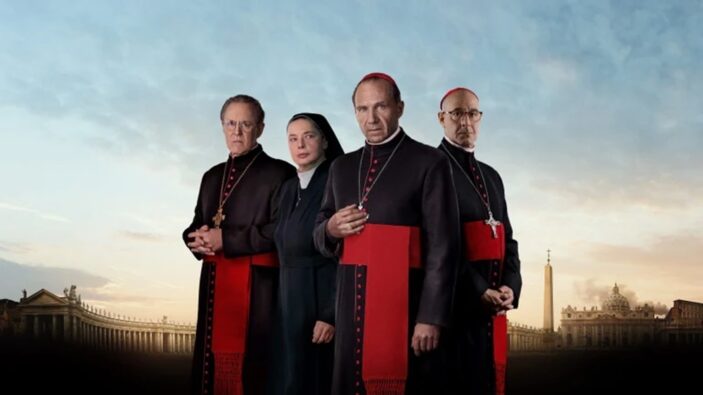
Similar to how, in equal measure, the Catholic church is an institution that earns both regard and revile, Conclave, Edward Berger‘s scandalous mystery set within the walls of the Vatican, is, at once, a revealing thriller as much as it is a delicious farce.
Made all the more chewable due to Peter Straughan‘s script honing an awareness as to just how fractured a reputation the Catholic church has – at the recent Golden Globes, said script took home the award for Best Screenplay – as well as centering itself around a progressive mentality that is likely to impress some audiences and anger others, there’s a richness to Conclave that keeps the film continually investing.
When the pope passes away under mysterious circumstances at the offset of the film, Berger and Straughan waste little time in setting up Conclave‘s narrative hook, that it falls to the Dean of the College of Cardinals, Cardinal Lawrence (Ralph Fiennes, superb), to facilitate an election to choose the late pope’s successor. The four main candidates for the job – Aldo Bellini (Stanley Tucci), a liberal in the same vein as the late pope; Joshua Adeyemi (Lucian Msamati), a conservative; Joseph Tremblay (John Lithgow), a moderate; and Goffredo Tedesco (Sergio Castellitto), a far-right traditionalist – travel from across the globe (the United States, Nigeria, Canada and Italy, respectively) for proceedings, with certain pre-determined agendas already in play.
Whilst there’s an initial feeling that Conclave is setting itself up as a type of “Who killed the pope?” mystery, Knives–Out-in-the-Vatican this is not, with the film ultimately disregarding the pope’s passing and, instead, concerning itself with the pope’s actions in those final moments, actions that question certain legitimacies and validation around the candidates to succeed him; for one, the Archbishop (Jacek Koman) claims the pope demanded the resignation of Tremblay on the night of his death, something the Canadian Cardinal denies.
Considering that so much of Conclave‘s two-hour running time is devoted to the voting process of these impending popes, it’s truly remarkable how much Straughan’s script keeps us enveloped in tension. The sanctity of such a vote must be kept from outside influence, but the process within the walls seems ripe for meddling and manipulation, and it’s the cattiness of the Cardinals that truly delights and offers such intrigue; the backstabbing and inherent bitchiness of the Real Housewives franchise doesn’t hold a candle to what these supposed saints are capable of.
Where the film ultimately travels and what it addresses feels remarkably topical in this current climate and, circling back to the opening remarks around the Catholic church’s perception, what it is saying about the hope of a progressive acceptance will either be a welcome or rejected stance. But the church has never been an institution to earn universal praise, and though, ironically, Conclave has been winning such acclaim, it too seems to revel in its chance to truly ruffle some feathers.
![]()
![]()
![]()
![]()
![]()
FOUR STARS (OUT OF FIVE)
Conclave is now screening in Australian theatres.
